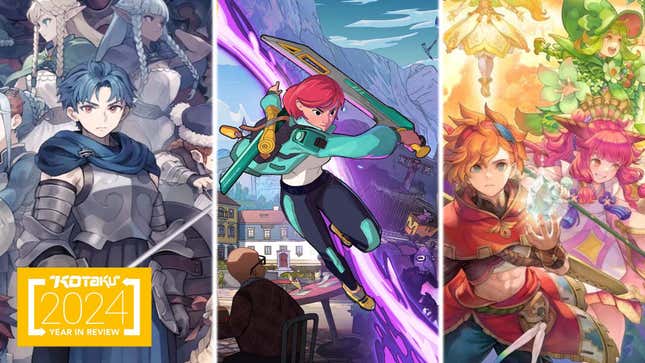
Image: Square Enix / Vanillaware / Microbird Games / Kotaku
We’re living through a role-playing game renaissance right now. The last several years have been full of great ones, and 2024 is no different. Everywhere you look the genre is growing, evolving, and dominating. From Japanese-style RPGs to Western-style ones, retro remakes to open-world sequels, there’s never been more to dig into for fans of exploration, branching dialogue, or just making the numbers go up.
This year saw the release of ambitious blockbuster RPGs iterating on tried-and-true formulas as well as bold mashups borrowing from the genres’ best to create something new and equally satisfying. The games were also long, from nearly 15 hours to over 65. Finishing every game on this list by focusing on the critical paths alone would take you roughly 513.5 hours, or about three months of treating them like full-time jobs. But of course the real delight of most RPGs is taking your time, exploring every last NPC conversation and dead-end path in a leisurely fashion until you’ve seen everything the game has to offer. And the following games offered a lot.
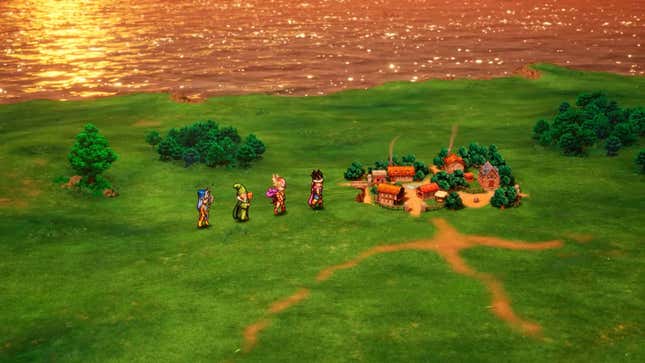
Image: Square Enix / Kotaku
I confess, the Octopath Traveler games left me a bit cold. I was utterly dazzled by their visuals but, in my estimation at least, they failed to actually capture the spirit of the games to which they were so reverently paying homage. But finally, Square Enix has nailed it by thoughtfully applying the HD-2D aesthetic to one of the actual masterpieces of the pixel art era, Dragon Quest III. The result is one of the best JRPGs of all time, given extraordinary new life through a visual treatment that respects the look and world design of the original game but makes that world newly wondrous to behold, popping with depth, tactility, light and shadow. It’s one of many RPG remakes this year that preserves what makes the original so terrific, enhancing visuals or other elements in such a way that newcomers and longtime fans alike can experience (or re-experience) these exceptional games in a way that feels fresh, contemporary, and alive. — Carolyn Petit
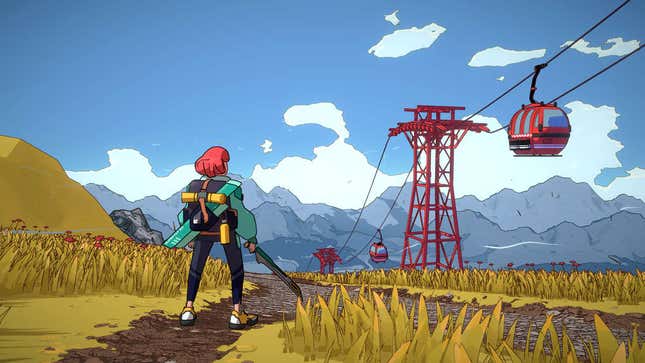
Image: Microbird Games
Dungeons of Hinterberg is the kind of RPG I want more of in my life. It mixes a contemporary setting with magic and monsters to create an oddly cozy action RPG that is hard to put down thanks to how it constantly builds on itself. The way Hinterberg is structured also helps as it forces you to interact with all of its systems, including the ability to develop friendships with other characters and explore its large maps filled with goblins, treasure, loot, and dungeons. By the end of Hinterberg, I was sad to be finished with it, but happy that I got to experience one of the best RPGs of 2024. — Zack Zwiezen
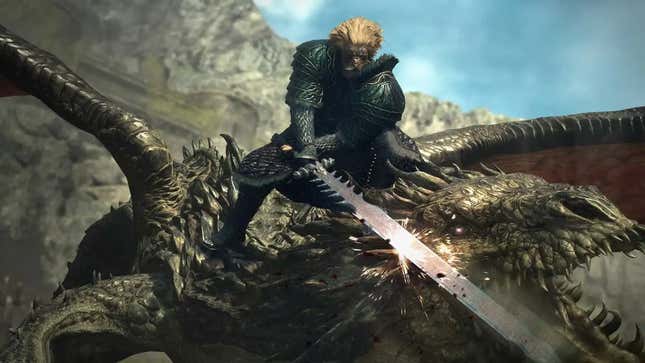
Image: Capcom
Many RPGs flatter the player with power fantasies and fated hero stories that make them an unstoppable force at the center of the universe. Dragon’s Dogma II wasn’t afraid to instead repeatedly knock you on your ass and make you adapt to everything from limited inventory systems to entire plagues. Its high-friction open world is risky but rewarding, full of unique emergent stories that belong solely to the person who experienced them. As Cole Kronman wrote in our review, “Dragon’s Dogma 2 is a game unburdened by any influence save that of its own predecessor; it is, on every level, a supremely confident melding of ideas; it contains at least a little bit of everything I’ve ever loved about video games.” — Ethan Gach
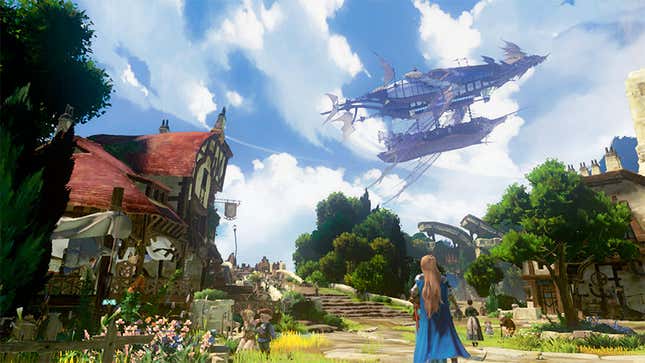
Image: Osaka Cygames
I went into Granblue Fantasy: Relink knowing almost nothing about the mobile game that preceded it, and found myself unexpectedly in love with its breezy sky pirate backdrop, crunchy combat, and streamlined structure. The game is split up into discrete missions designed to be endlessly replayed as you chase better scores, rewards, and end-game resources, and I can’t say the story left a very deep impression on me beyond the broad strokes of its heroic saga about fighting the evil empire and the powerful magic forces maneuvering beneath its surface. And that’s all fine. It nails the vibes and has a grand sense of scale, all while not getting in the way of the main attraction: big boss fights with slick and rewarding real-time action combat complete with MMO-like party synergies. — Ethan Gach
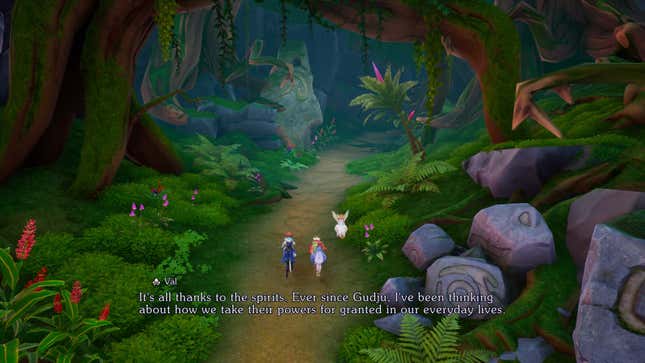
Image: Square Enix
Secret of Mana is an all-time favorite of mine. I’ve been waiting for a sequel to live up to the series’ SNES-era hype ever since. Visions of Mana is not a top-three Mana game, but it’s still a surprisingly good one. Solid combat and a vibrant if somewhat empty open world are propelled to the next level by wonderful music, old-school dungeons, and a great class-based progression system. Visions of Mana’s uniquely whimsical world was a breath of fresh air that reminded me how much more there can be to modern RPGs than grim sci-fi dystopias, modern schoolyard grinds, and classic medieval dragon slaying. It’s a shame the team behind it, NetEase’s Ouka Studio, was shut down as soon as the game shipped, but I’m hopeful it’s not the last we’ll see of this new era of Mana after the game’s director, Ryosuke Yoshida, joined Square Enix this month. — Ethan Gach
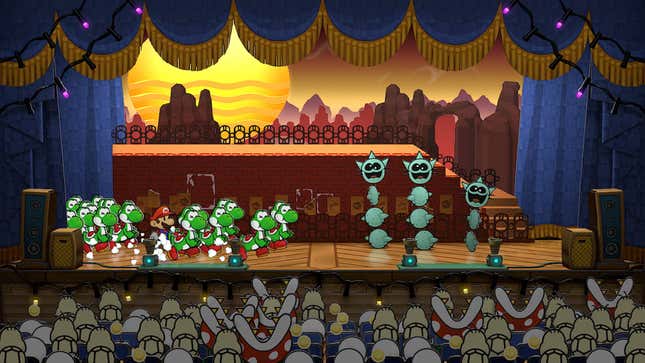
Image: Nintendo
Twenty years ago, Paper Mario: The Thousand-Year Door on GameCube enchanted me and countless other players with its wonderful writing, engaging combat, and elaborate papercraft world, so delightful to behold and explore. Not all games stand the test of time, but this year’s Switch remake proves that TTYD’s excellence really is timeless—if anything, the game has only grown in my estimation in the two decades since I first played it. It just goes to show you that characters this endearing, aesthetics this appealing, and gameplay mechanics this lively and approachable never go out of style.—Carolyn Petit
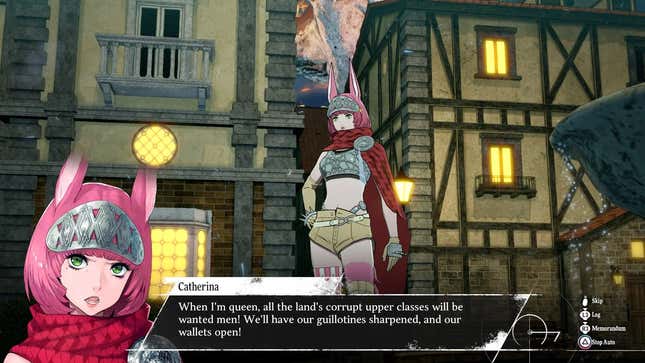
Image: Atlus / Kotaku
Metaphor: ReFantazio iterates on Persona’s calendar and social mechanics and ushers in a new era for Atlus’ social-sim RPGs. Its complex battle system and overtly political story make it a standout for a studio that’s no stranger to acclaim. Atlus has found a new pillar in its stable of franchises, and I’m looking forward to whatever the future looks like for this exciting new series. — Kenneth Shepard
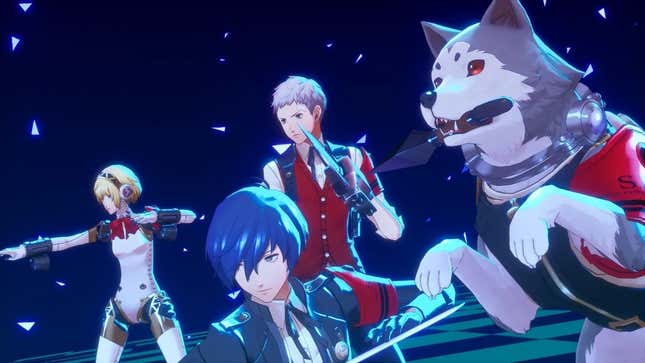
Image: Atlus / Kotaku
Persona 3 Reload is the best version of the best Persona. The from-the-ground-up remake maintains all the important parts of the 2006 classic while modernizing a lot of the dated mechanics and story elements that make the original a harder sell in 2024. It’s good to have such a readily accessible version of Persona 3 and its DLC to remind us that even though Persona 5 was what pulled the series into the mainstream, P3 is still the most consistent entry in the modern trilogy. — Kenneth Shepard
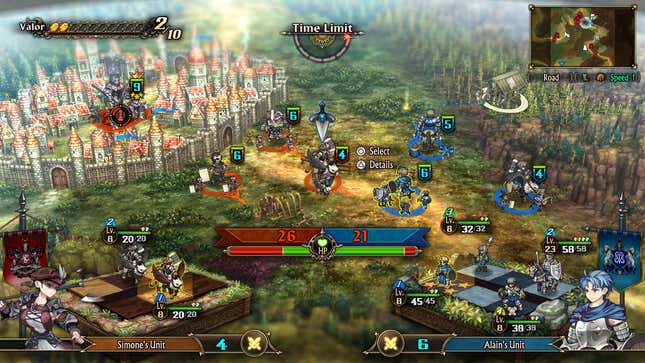
Image: Vanillaware
Vanillaware’s last decade has quickly cemented it as one of the most exciting and interesting studios operating around the periphery of traditional RPGs. 13 Sentinels: Aegis Rim was a fascinating remix of visual novel storytelling and kaiju battle strategy sim, and this year’s Unicorn Overlord is an equally rewarding twist on the classic tactical RPG. Like a modern auto chess reimagining of Ogre Battle, Unicorn Overlord takes Vanillaware’s flashy art style and applies it to a dense medieval political epic that plays out across slick 2D battles and top-down real-time strategy maps. It’s like a big bowl of slow-cooked oatmeal: long and repetitive yet rich and filling. — Ethan Gach
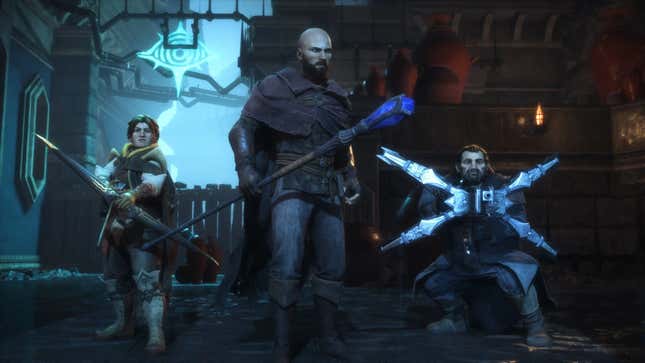
Image: BioWare / Kotaku
Dragon Age: The Veilguard has been a divisive game for both good- and bad-faith reasons, and despite its stumbles, it still feels like the result of BioWare having its priorities straight for the first time since Mass Effect 3. The Veilguard features one of the studio’s best casts, gutting narrative twists, difficult decisions, and expressive combat. With it, BioWare is making a concerted effort to wrap up over a decade of worldbuilding and potentially make space for what comes next. Whatever that looks like, it feels good to be excited for the studio’s future once more. — Kenneth Shepard
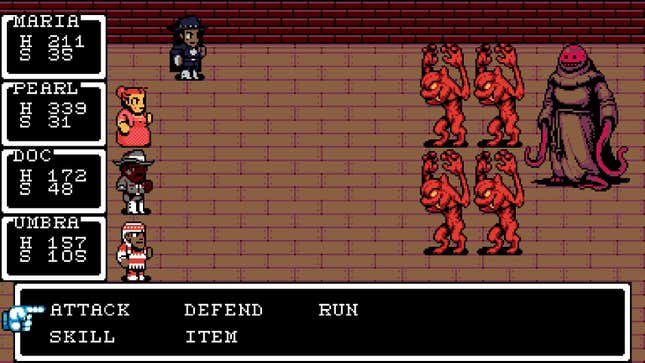
Image: Mossmouth / Kotaku
Amid UFO 50’s bounty of games from a fictional developer of the 1980s is Grimstone, a JRPG that’s aesthetically and mechanically akin to games of the era like the original Final Fantasy and Dragon Quest but that also distinguishes itself in some important ways. It eschews the fantasy settings that dominated the genre then (and the sci-fi ones, too—I didn’t forget about you, Phantasy Star) for its own distinctive world, one with archetypes and imagery rooted in Westerns but with some horror-adjacent elements as well. Of course, there are the monsters and demons running rampant in the world, but there’s also the fact that the world’s currency is teeth, a detail which continually unnerved me across my ~15 hours with the game.
I’ve seen people complain that Grimstone is “poorly designed,” they feel, because it doesn’t tell you what the different items you find throughout do. That’s a valid argument, I suppose, but part of what I loved about Grimstone—and indeed, about UFO 50 in its entirety—was the way I was encouraged to experiment, to push up against the limitations of games and see what the rules of their different worlds were. It’s a type of discovery that once felt common in games—many people my age, I think, know the feeling of encountering an opaque game on a relative’s computer, or being left alone with grandpa’s Intellivision—but that’s become increasingly rare as more and more games build thorough instructions into the games themselves rather than expecting you to keep a manual on hand. That sense of progress and discovery never flagged during my time with Grimstone—finding each new town where I could rest at the inn was always a huge relief; conquering each new dungeon was always a thrill; scoring cool new weapons and spells was always a great reward for my efforts. And while Grimstone’s storytelling is fairly minimal by today’s standards, discovering the truth about its world was exciting, particularly because that world is so distinct from the worlds of the actual 1980s JRPGs I’ve played. Not unlike my time with Final Fantasy I’s pixel remaster a few years back, playing Grimstone was a terrific reminder that distilling the genre down to its fundamental essence and giving us just enough detail for our imaginations to do most of the work of bringing a world to life can still be a wonderfully captivating approach for a role-playing game. — Carolyn Petit
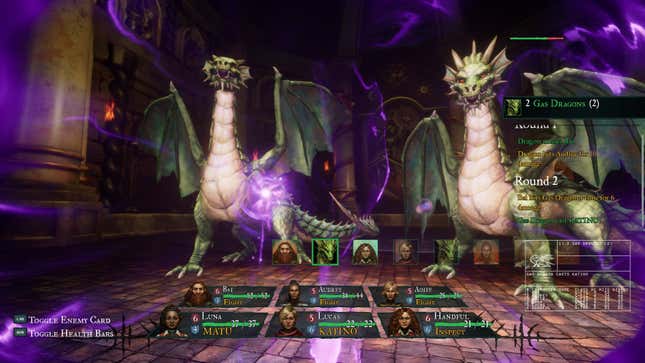
Image: Digital Eclipse
Oh, what a glorious remake. In 1981, Wizardry: Proving Grounds of the Mad Overlord was released and changed gaming forever, with its deadly monsters and devious dungeons helping to establish the template for party-based computer role-playing. Still, important as it was, it was hard to go back to that game today; at the time, players’ eager imaginations would fill in the gaps of its wire-frame dungeons, but nowadays, those primitive visuals and the game’s many other inconveniences stood between most players and the excitement and cultural impact of Sir-Tech’s masterpiece.
Enter Digital Eclipse, who knew exactly what to enhance and what to leave alone in bringing PGotMO into the modern era. Transparently built right on top of the original game, this remake brings the dungeons and monsters to vibrant life with lush, atmospheric 3D visuals and terrific sound effects, while also implementing a slew of quality-of-life improvements that cut down on needless frustration while preserving the original game’s vision and difficulty. In the 40+ years since Wizardry’s release, storytelling in role-playing games has evolved tremendously, but playing it this year reminded me that there’s still no substitute for the thrill of delving ever-deeper into a deadly dungeon, enduring hardship and defeat on the road to conquering its traps and defeating its monsters, and making up a story in your own head about the party of heroes you’ve created to tackle it all. — Carolyn Petit
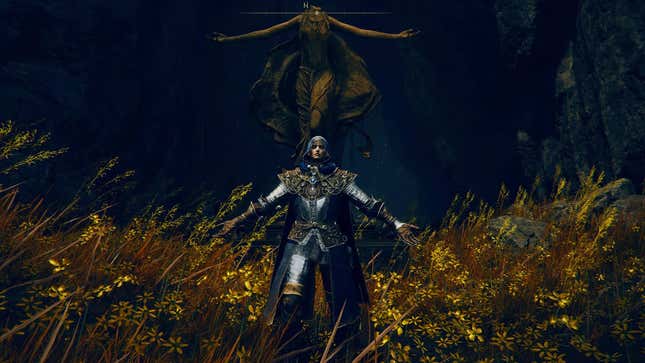
Screenshot: FromSoftware / Kotaku
True, it’s only an expansion. Yes, you have to play dozens of hours and beat tons of hard bosses just to access it. And yet there’s no denying that Shadow of the Erdtree is way more of one of the best games of 2022 without being just more Elden Ring. “Shadow of the Erdtree is nothing short of magnificent,” wrote former senior editor Alyssa Mercante. “It is both an expansion to and a distillation of what makes the original game so special, offering you a chance to try out new weapons and builds while learning far more about the Lands Between than you might have expected. It will delight you in one breath and devastate you the next, forcing you to question your approach, to fortify your spirit.” — Ethan Gach

Screenshot: Sega / Kotaku
While many large RPGs with big worlds leave us wondering whether such an abundance of activities and side quests are worth the time and effort, Like a Dragon: Infinite Wealth raises no concerns about quantity over quality. With a compelling gangster narrative, fantastic characters, and a thoroughly engaging turn-based combat system, Infinite Wealth is easily one of the must-play RPGs of 2024.
Though having knowledge of previous Yakuza games will certainly give you some great context, Infinite Wealth tells a focused story you can appreciate even if it’s your first foray into the series. With a plot centered on protagonist Ichiban Kasuga’s search to meet his long-lost mother, as well as on co-protagonist Kazuma Kiryu’s last days as he succumbs to cancer, the narratives in Infinite Wealth are grounded and intriguing. And despite covering such serious ground as estranged family relationships and terminal illness, Infinite Wealth is never afraid to dive into hilarious absurdities, such as a pet crawfish’s search for love. The game also features a ton of mini-games that are naturally embedded in the top-level gameplay, including an entire island-resort management game.
Infinite Wealth tells rewarding stories of relatable human experiences with dozens of hours of engaging side-activities that rarely burden you with busywork. If you tire of fantastical settings that feel too detached from reality and instead want to follow the sometimes-goofy trials and tribulations of troubled-yet-endearing characters trying to make the best of their difficult lives, Infinite Wealth needs to be on your list if it isn’t already. — Claire Jackson
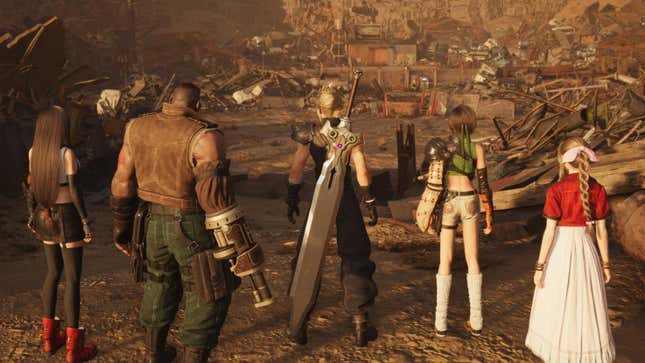
Screenshot: Square Enix / Kotaku
No RPG has bemused, frustrated, and delighted me more this year than Final Fantasy VII Rebirth. The second chapter in Square Enix’s retelling of its 1997 PS1 hit, it’s way too long and crammed with way too much filler. The endless minigames, distractions, side-shows, and routine overindulgences don’t always hit, but when they do, it makes Rebirth feel like it’s more alive and having more fun than almost any other game other there. Some RPGs are better than the sum of their parts. Rebirth is an epic slog that nevertheless manages to be more interesting, bold, and unforgettable than the average of its many highs and lows. It’s big-budget gorgeous yet still unabashedly absurd and over-the-top at any opportunity it gets. — Ethan Gach



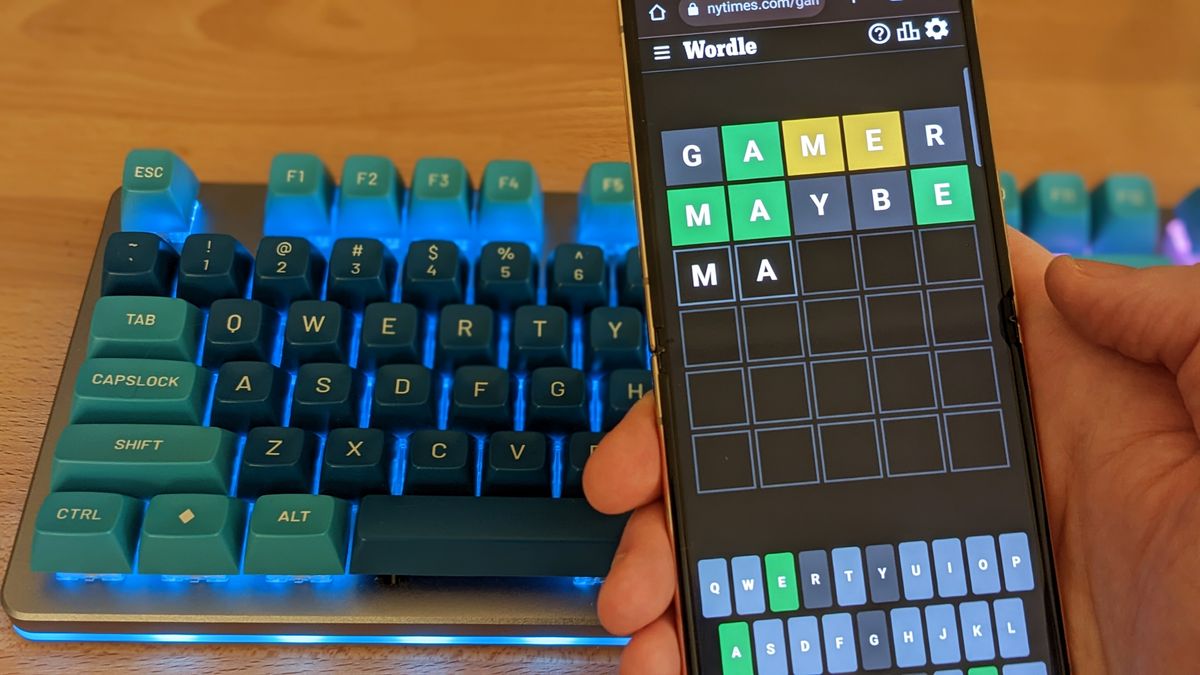





 English (US) ·
English (US) ·